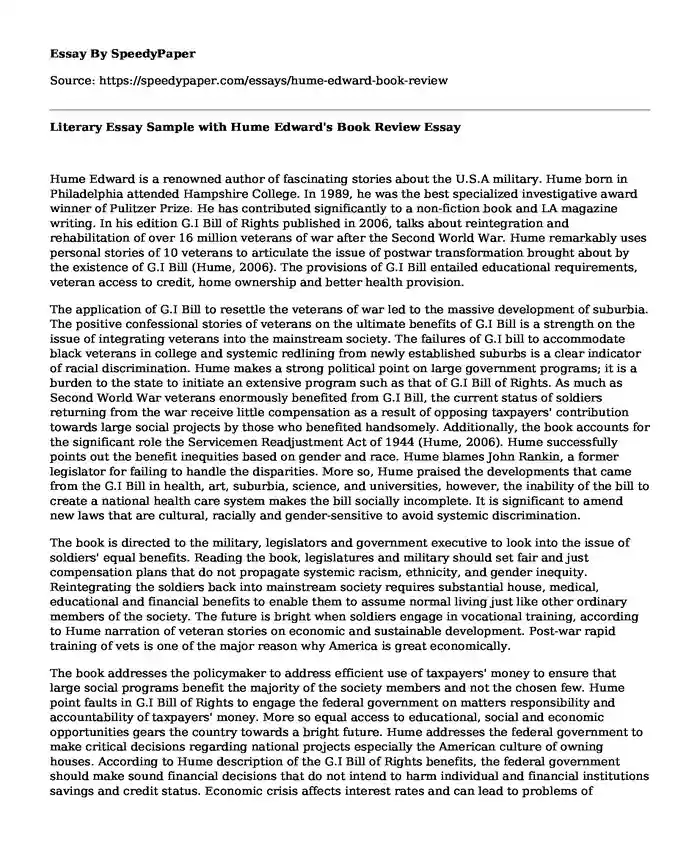
| Type of paper: | Book review |
| Categories: | American literature |
| Pages: | 3 |
| Wordcount: | 643 words |
Hume Edward is a renowned author of fascinating stories about the U.S.A military. Hume born in Philadelphia attended Hampshire College. In 1989, he was the best specialized investigative award winner of Pulitzer Prize. He has contributed significantly to a non-fiction book and LA magazine writing. In his edition G.I Bill of Rights published in 2006, talks about reintegration and rehabilitation of over 16 million veterans of war after the Second World War. Hume remarkably uses personal stories of 10 veterans to articulate the issue of postwar transformation brought about by the existence of G.I Bill (Hume, 2006). The provisions of G.I Bill entailed educational requirements, veteran access to credit, home ownership and better health provision.
The application of G.I Bill to resettle the veterans of war led to the massive development of suburbia. The positive confessional stories of veterans on the ultimate benefits of G.I Bill is a strength on the issue of integrating veterans into the mainstream society. The failures of G.I bill to accommodate black veterans in college and systemic redlining from newly established suburbs is a clear indicator of racial discrimination. Hume makes a strong political point on large government programs; it is a burden to the state to initiate an extensive program such as that of G.I Bill of Rights. As much as Second World War veterans enormously benefited from G.I Bill, the current status of soldiers returning from the war receive little compensation as a result of opposing taxpayers' contribution towards large social projects by those who benefited handsomely. Additionally, the book accounts for the significant role the Servicemen Readjustment Act of 1944 (Hume, 2006). Hume successfully points out the benefit inequities based on gender and race. Hume blames John Rankin, a former legislator for failing to handle the disparities. More so, Hume praised the developments that came from the G.I Bill in health, art, suburbia, science, and universities, however, the inability of the bill to create a national health care system makes the bill socially incomplete. It is significant to amend new laws that are cultural, racially and gender-sensitive to avoid systemic discrimination.
The book is directed to the military, legislators and government executive to look into the issue of soldiers' equal benefits. Reading the book, legislatures and military should set fair and just compensation plans that do not propagate systemic racism, ethnicity, and gender inequity. Reintegrating the soldiers back into mainstream society requires substantial house, medical, educational and financial benefits to enable them to assume normal living just like other ordinary members of the society. The future is bright when soldiers engage in vocational training, according to Hume narration of veteran stories on economic and sustainable development. Post-war rapid training of vets is one of the major reason why America is great economically.
The book addresses the policymaker to address efficient use of taxpayers' money to ensure that large social programs benefit the majority of the society members and not the chosen few. Hume point faults in G.I Bill of Rights to engage the federal government on matters responsibility and accountability of taxpayers' money. More so equal access to educational, social and economic opportunities gears the country towards a bright future. Hume addresses the federal government to make critical decisions regarding national projects especially the American culture of owning houses. According to Hume description of the G.I Bill of Rights benefits, the federal government should make sound financial decisions that do not intend to harm individual and financial institutions savings and credit status. Economic crisis affects interest rates and can lead to problems of borrowing and circulation of money. Also, social, economic and political transitioning is essential in accommodating the soldiers from the war zones. Development through academia leads to creativity and innovation.
Reference
Humes, E. (2006). Over Here: How the G.I. Bill Transformed the American Dream. Harcourt. ISBN: 0151007101
Cite this page
Literary Essay Sample with Hume Edward's Book Review. (2022, Mar 04). Retrieved from https://speedypaper.net/essays/hume-edward-book-review
Request Removal
If you are the original author of this essay and no longer wish to have it published on the SpeedyPaper website, please click below to request its removal:
- Free Essay Sample: Consequences of Internet
- Free Essay - Cell Phones Create a Barrier to Social Connections
- Essay Example: Home Care for Elderly
- Election of 1800 - Free Essay in American History
- Western Way of War Shaped Conflicts, Free Essay Example
- Free Essay Example on Washington Irving and James Fennimore Cooper
- Paper Example. 19 Century Literary Analysis
Popular categories




